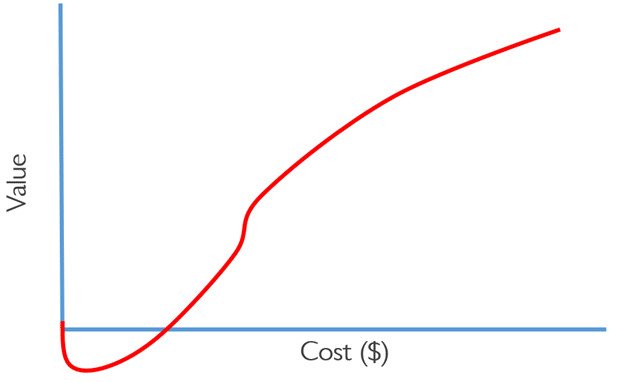How Much Should an Energy Audit Cost?
If you manage a building, an energy audit is a smart first step—and it should pay off. But not all audits are created equal. In fact, choosing the lowest bidder can sometimes be worse than doing nothing at all.
Take a look at the Kelsey Curve shown below. This simple chart from kw-engineering.com and developed by Barry Abramson, illustrates a clear point: below a certain cost threshold, the value of an energy audit drops—and can even become negative.
Why? Because a poor audit can lead you in the wrong direction, costing more than it saves.
Cheap Doesn’t Mean Cheerful
Every audit, even a basic one, requires a baseline level of effort—collecting data, visiting the site, analyzing systems, and making informed recommendations. If the price is unusually low, ask yourself what’s being skipped—or who’s doing the work.
Inexperienced auditors may offer impractical or boilerplate recommendations with inflated savings. If you follow them, you could end up spending money on projects that don’t deliver—or worse, make things worse.
Be Wary of “Free” Audits
Free audits often come with strings attached—usually a sales pitch for a specific product like a heat pump or LED upgrade. These audits might steer you toward a single solution, overlooking other priorities like insulation or system optimization.
Utility-sponsored audits are typically helpful, but are often designed to support specific programs, not provide a full picture of your building’s needs.
Don’t Settle for a Check-the-Box Report
A superficial audit may create a false sense of progress. You might think you’ve already covered your bases—and continue wasting energy (and money) for years.
So What Should It Cost?
For larger commercial or institutional buildings, full audits typically range from $0.15 to $0.50+ per square foot, depending on complexity. That covers on-site assessments, detailed analysis, and customized recommendations.
You can narrow the scope to reduce cost—say, just lighting—but don’t confuse that with a comprehensive audit.
Bottom Line
A good energy audit doesn’t just list projects. It helps you prioritize, avoid mistakes, and unlock long-term savings. A few cents per square foot is a small price to pay if it could save you thousands on future utility bills.
The only thing worse than wasting your energy is paying someone to tell you how to do it. Because if you're not managing your energy, who is?
2-Minute Payback is GRCL’s blog of energy-saving tips and tools for busy building managers. This post was written by Chuck Faulkner.

